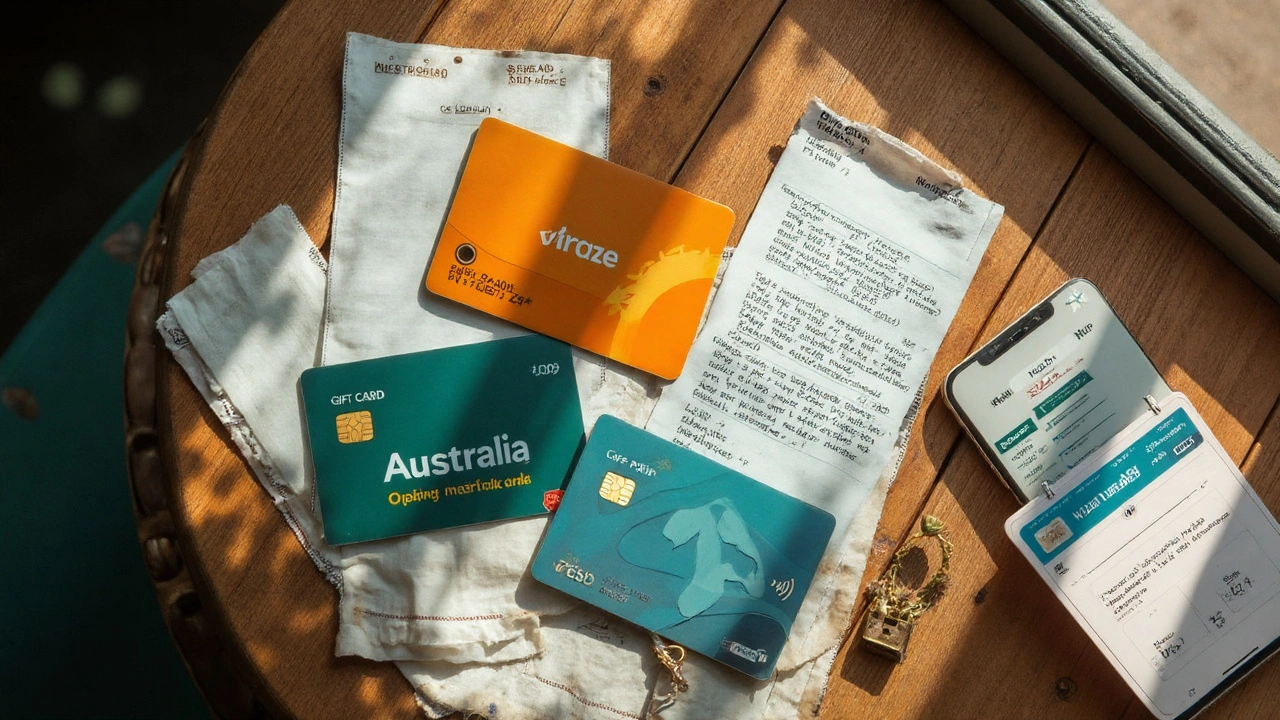
You searched “Gift Card” because you need a fast, safe, and not-boring way to give (or spend) money without guessing sizes, brands, or shipping times. Here’s the catch: the wrong choice leads to fees, awkward returns, and cards that expire before they’re used. The right choice feels personal, works everywhere it should, and won’t get nuked by a scammer. I live in Melbourne and use gift cards a lot-birthdays, teacher thank-yous, even my own budget tricks-so this is the practical, Australia-first guide I wish more people read before tapping “buy”. And yes, we’ll keep it simple.
TL;DR
- Australian law: most gift cards must last at least 3 years (ACCC), expiry must be printed, and post-purchase fees are banned (some exceptions apply).
- Pick the card by certainty: know the exact store? Get that store’s card. Not sure? Choose Visa/Mastercard/eftpos. Need digital fast? eGift.
- Watch for pitfalls: activation fees on open-loop cards, preauthorisations at fuel/hotels, and scam requests to pay bills with gift cards (it’s always a scam).
- Buy on promo when safe, register digital cards, set reminders for expiry, and keep receipts; treat cards like cash.
- Can’t decide? Multi-brand cards (The Card Network/Ultimate) split the difference without narrowing you to one store.
How gift cards work in Australia (types, rules, and the money traps)
Start with the basics. A gift card is a prepaid instrument. The brand and the network decide where it works, and Australian Consumer Law sets key rules on expiry and fees. If you know the category, choosing gets easy.
Types you’ll see in Melbourne (and across Australia):
- Store-specific (closed-loop): Think Bunnings, JB Hi-Fi, Myer, Rebel. Usually no purchase fee, best value at that retailer, good promos during holidays. You’re locked to that brand.
- Open-loop (Visa/Mastercard/eftpos): Works almost anywhere that network is accepted. Great when you don’t know what they want. Expect a one-off purchase/activation fee. Post-purchase fees are banned by law, but purchase fees at the time of issue are allowed.
- Multi-brand (e.g., The Card Network “Her/Him/Teen”, Ultimate Gift Cards): Usable at a curated list of retailers. Broader than a single store, narrower than Visa/Mastercard. Check the participating list before you buy.
- Platform/app stores (Apple, Google Play, Xbox, PlayStation): Perfect for gamers, apps, subscriptions inside that ecosystem. Won’t work outside that platform.
- eGift cards (digital): Delivered by email/SMS instantly. Handy for last-minute gifts or distance. Save a copy in your email and wallet app, and note that some digital barcodes need in-store scanning.
Australian rules you should know (source: ACCC and ASIC Moneysmart):
- Expiry: Most gift cards must last a minimum of three years from the date of purchase. The expiry date must be clear on the card or receipt. Some cards don’t expire; check the fine print.
- Fees: Post-purchase fees that reduce the card value are banned. That means no monthly “inactivity” fees. Fees that happen before or at purchase (like an activation fee on a Visa card) are allowed. Booking or transaction fees charged by a merchant for a service may still apply.
- Exemptions: Some things aren’t covered by the 3-year rule (for example, vouchers for a specific time-limited event). Always read the terms.
How the money can slip away:
- Open-loop activation fees: That $100 Visa gift card with a $5.95 fee is really $105.95 at the register. You’re paying for flexibility. Decide if it’s worth it.
- Preauthorisations: Fuel pumps, hotels, and car hire can place a hold above the transaction amount. If the hold exceeds the card balance, it may decline. Pay inside at fuel with a set amount (e.g., $40) to avoid holds; ask hotels to use a different card for security.
- Online checkout quirks: Some prepaid cards fail on subscriptions, ride-share, or foreign sites due to address checks or 3-D Secure. Have a backup plan or use the card in-store.
- Scams: No legitimate company, the ATO, or the police will ask you to pay bills or fines with gift cards. If someone pushes you to buy and read out codes, it’s a scam. Hang up.
How to choose the right card (fast decision rules, comparisons, and scenarios)
Think of choice as a quick decision tree. If you can answer two questions-How well do I know their taste? Will they shop online or in-store?-the answer appears.
Fast rules of thumb:
- If you know their favourite store: get that store’s card (best value, often no purchase fee).
- If you don’t know: choose Visa/Mastercard/eftpos (pay the fee for flexibility) or a multi-brand card that matches a theme (e.g., dining, fashion, home).
- If you need it now: eGift (arrives in minutes). Double-check the recipient’s email or phone before you hit pay.
- If they’re subscription-heavy: platform card (Apple/Google/Xbox) or a retailer they use often.
- If you’re splitting among people: split the amount across two smaller cards, or pick a multi-brand card that covers both interests.
Here’s a plain-English comparison:
| Card Type | Where it Works | Typical Expiry | Fees | Online Friendly | Best For | Watch Outs |
|---|---|---|---|---|---|---|
| Store-specific | One retailer (e.g., JB Hi-Fi, Bunnings) | Mostly 3 years (check card) | Usually none at purchase | Yes, if retailer supports online codes | When you know the exact store they love | Locked to one brand; returns usually go back to card credit |
| Open-loop (Visa/Mastercard/eftpos) | Anywhere that network is accepted | Commonly 3 years | One-off purchase/activation fee | Mixed; subscriptions or foreign sites may fail | When you want max flexibility | Preauthorisation holds at fuel/hotels; keep receipt for activation |
| Multi-brand (Ultimate/TCN) | A set list (fashion, home, dining) | Usually 3 years | Usually none at purchase | Often yes, only at participating stores | When you know the category but not the store | Participating list can change; check before buying |
| Platform (Apple/Google/Xbox/PlayStation) | Inside that app/store ecosystem | Often no expiry (varies) | None at purchase | Yes-designed for digital use | Gamers, app lovers, subs | Can’t use outside the platform |
| eGift (digital) | Online or in-store via barcode | Same as the underlying card type | Usually none at purchase | Yes; email delivery | Last-minute or distant gifting | Wrong email = painful; save the code securely |
Everyday scenarios:
- For teens: a multi-brand “Teen” card or platform card (gaming/streaming). Keep the receipt and share a screenshot of the code (privately) in case they misplace it.
- Housewarming or new renters: Bunnings or an open-loop Visa/Mastercard. They can buy tools, plants, or split it between stores.
- Thank-you for a teacher or coach: a dining or coffee-themed multi-brand card; low friction and feels thoughtful.
- Workplace Kris Kringle: $30-$50 multi-brand or open-loop eftpos. Limit the risk of a miss.
- For someone overseas: a network card probably won’t work outside Australia; use a global digital gift via the recipient’s local store or platform.
When to pay the activation fee: if you truly don’t know the recipient’s preferences or you need the card to work across many stores, the open-loop activation fee can be worth it. If you do know their favourite places, skip the fee and get a store card.

Buy, store, and spend without getting burned (step-by-step, checklists, and pro tips)
Buying steps that save headaches:
- Pick the type using the rules above. If unsure, an Ultimate or TCN card focused on dining/fashion/home covers most needs.
- Check the value and packaging at the shelf: look for tampering, exposed PINs, or damaged scratch panels. If anything looks off, pick another card.
- Activate properly at checkout: many cards require activation at the register. Keep the receipt, which often shows the last four digits and value.
- For eGift: triple-check the recipient’s email or mobile. Send yourself a copy if the store allows.
- Note the expiry in your calendar: set a reminder 1 month and 1 week before expiry. Future you will thank you.
Pro spending tips:
- Split payments: if your purchase is bigger than the card balance, ask the cashier to put a set amount on the card first, then pay the rest with another method. Online, many sites don’t support split payment-use the card in-store or buy a store eGift online, then apply it.
- Fuel and hotels: avoid tap-and-go at unmanned fuel pumps with prepaid cards; pay a fixed amount inside. For hotels, don’t use a gift card for the security hold.
- Online hiccups: if an open-loop card fails online, register it (if the issuer allows), try domestic sites, or use it in-store. Some merchants require a name/postcode; follow the issuer’s instructions.
- Returns: most store refunds go back to the same gift card. Keep the physical card or save the eGift code until you know you’re keeping the item.
- Balance checks: do them on the issuer’s site or phone line shown on the card. Screenshot the balance for your records.
Security and scam hygiene (please do these):
- Treat cards like cash. If it’s lost or stolen, replacement isn’t guaranteed. Some issuers may help if the card is registered and unused-ask quickly.
- No bill or fine is paid with gift cards. The ATO, police, the NBN, or your bank will never ask for gift card codes. Hang up, block, report to Scamwatch.
- Don’t scratch or reveal PINs until checkout. Never send pictures of the back of a card to strangers or “buyers”.
- Buying second-hand? Use a trusted marketplace with protection and verify the balance in real time with the seller on video/chat. Risky, so weigh the savings.
- Card swap schemes: only swap with people you know or through official retailer programs. Too many fakes and drained cards out there.
Money-savvy extras (Melbourne-friendly):
- Promos: supermarkets often run legit bonus points or percentage-off deals on select branded cards. Read the fine print: limits per person, excluded products, and whether you need to scan your loyalty card.
- Stacking: buy a retailer gift card on promo, then use it during the retailer’s sale. Double win without gaming the system.
- Self-gifting: use a store card for your own big purchases to lock in a discount during a promo period. Only do this with stores you’ll definitely use and amounts you’ll spend within a few months.
FAQs, fixes, and next steps (for gifters, recipients, and business buyers)
Quick answers to the most common questions in Australia:
- Do gift cards expire? Most must last at least 3 years under Australian Consumer Law. Some have no expiry (depends on the issuer). The expiry date must be shown.
- Are there fees? No post-purchase “inactivity” fees allowed. Open-loop cards often charge a one-off activation fee at purchase. Merchants can still have normal booking or card surcharges not related to the gift card itself.
- Can I get cash from a gift card? Usually no. Cards are for goods/services. Some stores may allow cash-out with eftpos cards, but don’t count on it; it’s not a legal right.
- What if I lose the card? Treat it like cash. If the card was registered to your email/phone and unused, contact the issuer immediately; replacement is discretionary.
- Are digital gift cards safe? Yes, if you keep the code private and store it securely (email archive and phone wallet). Use a strong email password and 2FA.
- What’s the safest place to buy? Direct from the retailer or a well-known supermarket or official issuer website. Be careful of third-party sites you don’t recognise.
- Can I add a Visa/Mastercard gift card to Apple/Google Wallet? Some issuers allow it; others don’t. If mobile wallet is important, check the packaging or issuer FAQ first.
- Why does my card decline online? Common reasons: insufficient balance, overseas processing, address checks, or 3-D Secure. Try an Australian site, register the card if possible, or use in-store.
Troubleshooting by persona:
- Gifter (bought in-store and code isn’t working):
- Check the receipt to confirm activation and value. If it shows “not activated,” return to the store with the card and receipt.
- Try a small in-store purchase to test (e.g., $5). If it still fails, contact the issuer using details on the back.
- Gifter (eGift sent to wrong email):
- Contact the issuer immediately. If the code isn’t redeemed, they may cancel and reissue. Time matters.
- For future sends, email it to yourself first, then forward to the recipient.
- Recipient (balance doesn’t match expectation):
- Check if the merchant preauthorised extra (fuel/hotel) or a partial payment succeeded.
- Do a balance check on the issuer’s site and screenshot it. If needed, raise it with the issuer and attach receipts.
- Recipient (online store rejects the code):
- For store cards: confirm you’re on the correct regional site (.com.au). Some codes are region-locked.
- For open-loop: try a smaller purchase, register the card if available, or use in-store.
- Business buyer (bulk gifting for staff or clients):
- Pick a mix: open-loop for flexibility plus a few category cards that fit your team (dining, home, wellness).
- Ask issuers about bulk discounts, branded eGifts, and reporting. Keep a tracking sheet of who got what, expiry dates, and balances.
- Remind recipients to treat cards like cash and to report suspected scams. Point them to ACCC and ASIC Moneysmart guidance.
A practical checklist you can copy into Notes:
- Before buying: type chosen, expiry checked, retailer list verified (for multi-brand), issuer trusted, activation fee noted (if open-loop).
- At checkout: card activated on the receipt, value correct, packaging intact, receipt stored.
- After buying: calendar reminder set (1 month and 1 week before expiry), code stored safely, balance check done.
- When spending: plan split payments if needed, avoid preauth situations with prepaid, keep the card until you’re sure about returns.
- If anything smells off: stop, verify with the issuer, or walk away. Scammers rush; real companies don’t.
Where to look for guidance you can trust: the ACCC (gift card laws and scam warnings), ASIC Moneysmart (practical money tips), and your card issuer’s terms page. When in doubt, those are the playbooks I follow here in Melbourne.
If you want the simplest choice with almost zero regret: pick a well-known multi-brand card or an open-loop Visa/Mastercard for flexibility, accept the one-off fee if needed, and set a reminder so not a dollar goes to waste. If you know the exact store they love, a store card beats everything on value and vibe. That’s the whole game.




Aaron Whong
September 2, 2025 AT 14:37The structural asymmetry of gift card liquidity in the Australian regulatory framework reveals a fascinating case study in consumer sovereignty under neoliberal governance. The ACCC’s three-year expiry mandate functions as a palliative institutional artifact-technically compliant yet epistemologically inert. What we’re witnessing is the commodification of affective labor through prepaid instruments, where the consumer is simultaneously coerced into temporal discipline and rendered hyper-visible via activation metadata. The open-loop fee structure? A classic rent-seeking mechanism disguised as market efficiency. And let’s not forget the performative safety rituals: registering cards, screenshotting balances, setting calendar reminders-these are the new Protestant work ethic for the digital age. We’ve turned gifting into a compliance exercise.
Cynthia Springer
September 4, 2025 AT 01:17I’m curious-how do these rules apply to gift cards bought overseas but used in Australia? Like, if someone gets a US Visa gift card and tries to use it at Coles or Bunnings? Does the ACCC still protect them, or is it a legal gray zone? I’ve had one decline before and just assumed it was a technical glitch, but now I’m wondering if it was a jurisdictional issue.
Brittany Medley
September 4, 2025 AT 21:34Important note: always check the fine print on multi-brand cards-some retailers leave the list of participating stores in a tiny footnote on the back, and it changes without notice. Also, if you’re buying for someone overseas, don’t even bother with Australian cards; they won’t work. Use a global digital gift card from Amazon, Apple, or Google instead. And please, for the love of all that is holy, never send a photo of the card’s back to anyone-even if they say they’re from “customer support.” It’s always a scam. I’ve seen it too many times.
Amanda Wong
September 4, 2025 AT 23:39This entire guide is dangerously naive. You’re telling people to trust the ACCC? The same agency that let banks charge $5 fees for using their own ATMs? And you think a three-year expiry is meaningful? Try living on a $100 card that expires in 2028 when inflation has turned it into $60 worth of groceries. This isn’t consumer protection-it’s corporate theater. And don’t get me started on ‘multi-brand’ cards-they’re just middlemen profiting off your indecision. Buy cash. Always buy cash.
Stephen Adeyanju
September 5, 2025 AT 13:29Bro the whole thing is a scam anyway why do you even care about expiry dates and activation fees when the real issue is that gift cards are just a way for companies to steal your money through inflation and bad customer service anyway just give cash or a paypal link and be done with it
james thomas
September 6, 2025 AT 16:15Let me guess-you're one of those people who thinks the government actually gives a damn about your gift card? Nah. The ACCC is just a PR front. Real talk: companies design these cards to expire. They bank on you forgetting. They profit from unused balances. That’s not a loophole-it’s the business model. And you? You’re just the sucker who sets calendar reminders instead of asking why this system exists in the first place. The real gift? Walking away from it all.
Deborah Williams
September 7, 2025 AT 12:34How ironic that we’ve turned the act of giving into a bureaucratic checklist. We once gave gifts because they carried meaning-now we give cards because we’re afraid of getting it wrong. And we’ve turned that fear into a manual: register, screenshot, remind, avoid preauth, check participating retailers, don’t scratch the PIN, verify the issuer, don’t use it for fuel, don’t use it online, don’t lose it, don’t trust anyone who asks for the code… We’ve created a gift-giving industry that makes people feel more anxious than joyful. Maybe the real gift is admitting we don’t know how to love each other without a receipt.
Kaushik Das
September 8, 2025 AT 21:25Man, this guide is gold. I’m from India, but my sister lives in Melbourne, and I send her gift cards every birthday. I always thought the Visa ones were the safest-now I know why. Also, the part about fuel pumps? Game-changer. I once had a card decline at a station because of a $100 hold. I thought it was broken. Now I just walk in and say ‘$40, please.’ And the multi-brand cards? Perfect for my cousin who loves coffee, books, and yoga gear. She gets three stores in one. No more awkward ‘what do you even like?’ conversations. Thanks for this.
Asia Roveda
September 9, 2025 AT 09:33Of course the Australian government says gift cards last three years. They’re just trying to make you feel safe while the banks and retailers quietly siphon off billions in unused balances. This isn’t consumer protection-it’s a distraction tactic. Meanwhile, the real problem is that we’ve outsourced emotional intelligence to plastic. You don’t know what your friend likes? That’s not a gift card problem-that’s a relationship problem. And if you’re buying a card because you’re too lazy to know someone, you don’t deserve to give them anything.